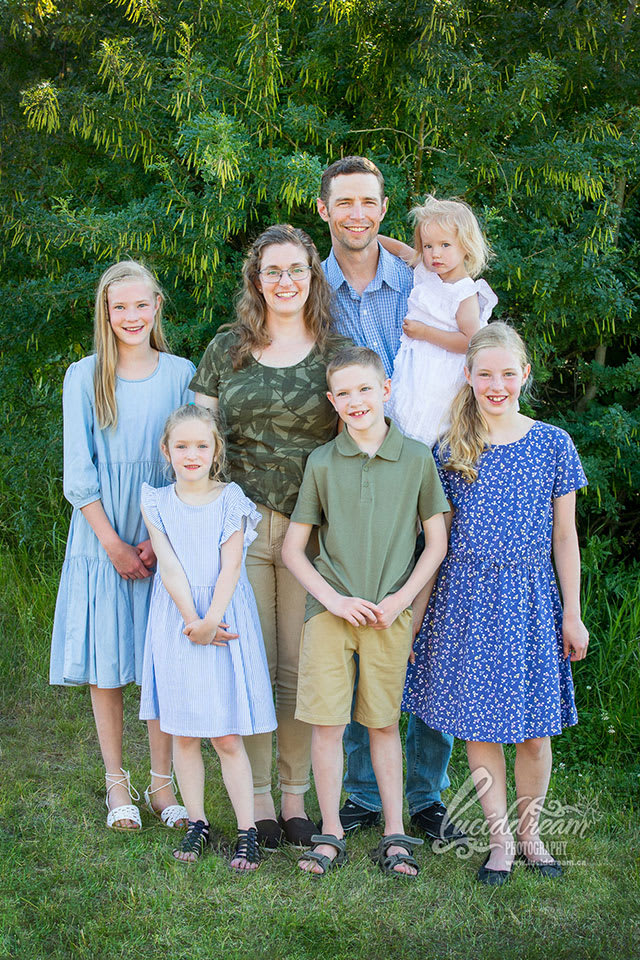About
Why Messiah?
The word Messiah is an ancient Hebrew word that means God's Anointed One. It has the same meaning as the Greek word Christos, from where we get the word Christ. Jesus is the Messiah, God's Anointed One.
What does it mean that Jesus is God's Anointed One? It means that he is our prophet, our priest, and our king. During the time of the Old Testament, God chose certain people to speak as prophets, to offer sacrifices as priests, and to rule as kings. They were anointed with oil at the beginning of their ministries to show that God had set them apart, and that he would equip them in a unique way with his Holy Spirit to perform their tasks.
When Jesus came into this world, he was anointed by the Holy Spirit at his baptism to fulfill all three roles. He is the great prophet, "the Word made flesh" (John 1:14), who fully declares to us the Word of God. He is the "great priest over the house of God" (Hebrews 10:21), who offered his life on the cross for our sins and now mediates for us in heaven. He is the "King of kings and Lord of lords" (Rev. 19:16), who has defeated death and is reigning over all. He is the Messiah!
The name Messiah places us in God's history. The church of the 21st century is rooted in God's ancient plan. The Old Testament prophecies found their fulfillment in Jesus. He is the permanent and eternal answer to all the needs of humankind. Before he came, all history pointed toward his coming. After he came, all history flows out of his victory and looks to his return.
The name Messiah reminds us that the Christian faith is not only about our personal salvation, but about God's plan for "making all things new" (Revelation 21:5). Through faith, we receive the privilege of fitting our lives into this grand and awesome design. God forgives us and promises us eternal life. Then he anoints us with the Holy Spirit for a life of love and obedience – we become followers of the Christ, disciples of the Messiah.
Structure
Our services are fairly structured and we do this with the following principles in mind:
Structure of Worship
Our services begin with the reading of the Word of God to reflect that it is God who begins a relationship with us. We respond to his call. The rest of worship can be summarized as a dialogue between God and his people, with the preaching of God's Word at the center. Before the preaching we prepare ourselves in order to listen, and after the preaching we respond in prayer and praise. It is our aim that God's desire to have a living relationship with his people would be a reality in our formal worship.
Style
We seek to apply biblical principles to our style of worship. You might notice this in the following characteristics:
Style of Worship
- The congregational singing. Singing God's praise is not for a select few with musical talents or beautiful vocals, but for the whole congregation both young and old. Everyone should be able to join in and praise our mighty God.
- The songs that we sing. Our praise-book consists of the 150 Psalms put to music and a number of hymns. The Psalms are the word of God and the songs and prayers of Old Testament saints. By singing them we follow the New Testament exhortation to sign Psalms, hymns and spiritual songs, (Colossians 3:16) and sing God's word back to him.
- The Psalms also provide us with models for songs we should sing. Our hymns are rich in content and focused on praising God together as a congregation
- Any music that accompanies the singing has the purpose of facilitating our singing as a congregation.
In sum, we try to honour God to the best of our abilities in our worship. God's word takes centre stage. And his word leads us in a dialogue which reflects the living relationship God wants to have with his people.
Our second service applies these same principles but is generally shorter and more interactive. This service focuses on teaching Christian doctrine using one of our confessions, usually the Heidelberg Catechism. If you want to learn more about the Heidelberg Catechism and how it is used in the church, you can click the button below.
Leadership
Reformed Church Leadership
According to the pattern described in scripture, Reformed churches are led by a pastor and a group of elders and deacons. The word elder means "shepherd," and those appointed to this role must lead the church following the example of the Great Shepherd, Jesus Christ. They are called to "care for the church of God, which he obtained with his own blood" (Acts 20:28). Elders and deacons are chosen by the congregation on the basis of their gifts and qualifications as described in Titus 1:7-9 and 1 Timothy 3:1-7. They subscribe to our confessions, promising not to teach anything that contradicts them, and they lead the church according to the policies in our Church Order. At this time our church has one pastor, three elders and one deacon.

Pastor Tim Schouten
Pastor Tim Schouten received his Masters of Divinity degree in 2012, and then taught grades 11-12 in a Christian high school for three years. He and his wife Linnet and their children moved to Prince George in April 2016, and he was ordained as a minister of God's word in May of the same year. If he is not in his office you might find Pastor Tim playing pick-up hockey at the local rink or exploring the beautiful Prince George outdoors with his family and a camera.
Smithers Canadian Reformed Church
In order to guard the well-being of the congregation and the pastor, our church is supported, assisted and accountable to the elders of the Smithers Canadian Reformed Church. This congregation called and sent a pastor to Prince George and formally cares for the members here. They oversee the work of Pastor Tim through regular communication and visits, and assist him and the members wherever possible.
The Canadian Reformed Churches
Our church is not only related to the Smithers Canadian Reformed Church, but is part of a wider federation of churches, that is, the Canadian and American Reformed Churches. Working together, these churches provide one another with wisdom, counsel, and accountability in many matters, including a seminary in Hamilton, Ontario.

What is a Reformed Church?

A Reformed church is a Christian church with roots in the Great Reformation of the 16th century. At that time, many biblical teachings that had been obscured or suppressed over the centuries were recovered. We believe that Reformed teaching is an accurate and faithful reflection of the teachings of Jesus, the Apostles, and the totality of the scriptures. We are thankful for the Reformation and want to continue its legacy into the present.
At the heart of the Bible is the message of the Gospel, the good news of Jesus Christ, our saviour and King. This is what was at stake during the Great Reformation, and it continues to be the treasure of the church today. God saves sinners (that's us) in Christ alone, by grace alone, through faith alone. He has provided an amazingly gracious way to everlasting life with Himself, that is, through the suffering, death, and resurrection of Jesus Christ. We receive complete forgiveness of our sins, the healing of our brokenness, and the hope of a future with God that is better than we can imagine.
To ensure that we don't lose, distort, or forget the gospel, we confess our faith using summaries called confessions. A church should not be blown about by every wind of doctrine (Ephesians 4:14), it needs truthful and stable boundaries that always bring it back to the scriptures. The confessions hold us to the Bible, and they provide us with a method of learning and confessing the Bible's basic teachings. To learn more about them, please visit our beliefs page.
The good news of Jesus Christ is the kind of news that needs to be spread far and wide. As the apostle Paul asked, And how are they to believe in him of whom they have never heard? And how are they to hear without someone preaching? (Romans 10:14) Everyone needs to hear the gospel again and again. That is why preaching takes center stage in our worship services. Preaching is the proclamation of the gospel and God uses it to strengthen and exhort those who listen.
The scriptures inform everything else we do in our services. God's Word is not only heard in the preaching, but is a thread throughout the service, to which we sing, pray, and worship our saviour in response. Worship is not about rituals and rites, but about hearing from God and responding to Him.
A beautiful testimony to the power of the gospel is the work of God in gathering believers together as the church, the body of Christ. God does not intend us to be Christians alone, but gives us brothers and sisters who worship together, pray together, study Scripture together, watch out for one another, and bear one another's burdens.
We would be delighted to have you discover and experience the riches of the Christian faith with us.
Contact
Contact Form
Resources
Welcome to Messiah
A quick reference pdf with information on our church and federation for newcomers and guests.
Messiah Liturgy
A pdf of our order of worship along with simple explanations for each element in our Sunday worship services.
Why We Have Creeds and Confessions
A pdf that dives into the Reformed church's use of brief summaries of the faith called Creeds and Confessions.
What is the Gospel?
Is your life seemingly falling apart? Are you depressed, sad or feeling lost and afraid? You need the gospel.
Who Are You?
Why am I here? Why do I feel so much pain and agony? Is there a way out of this mess? You need answers.
What is Faith?
Who can you trust? What does it mean to believe in someone or something? You need faith.